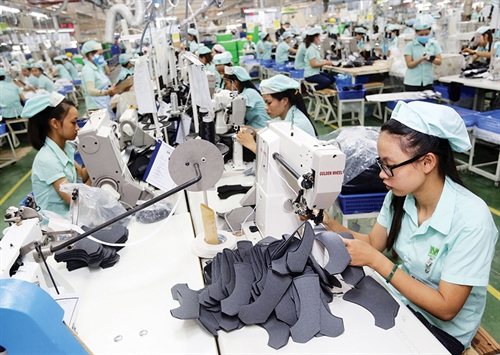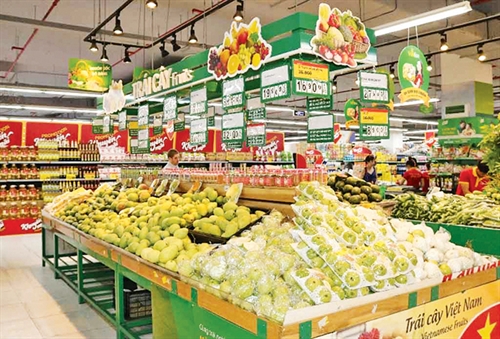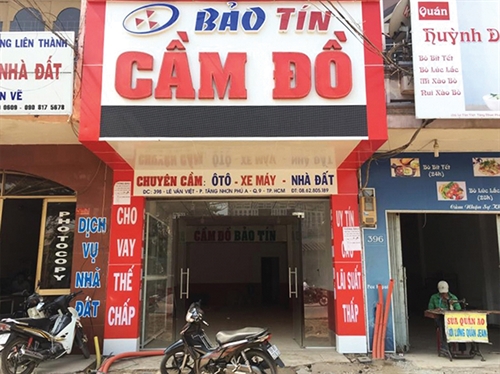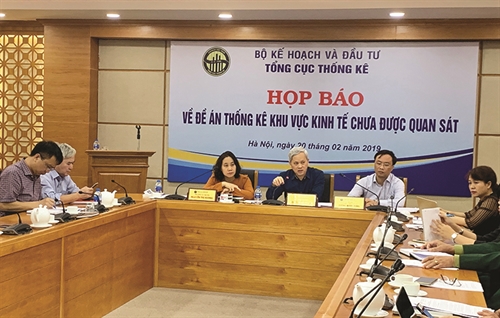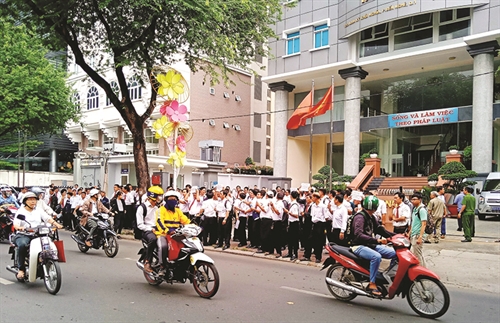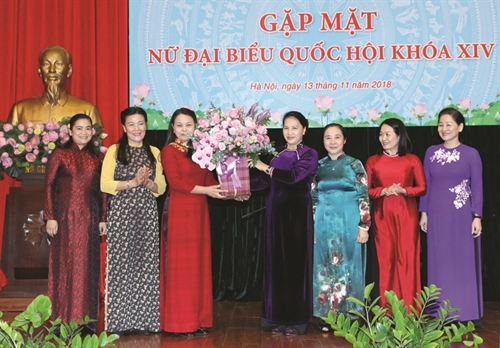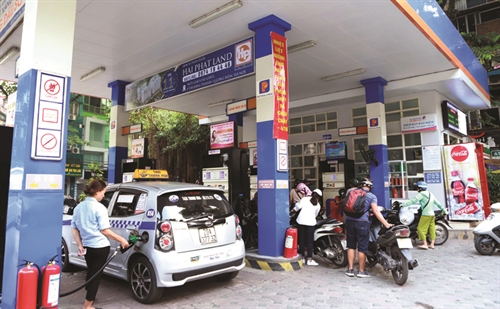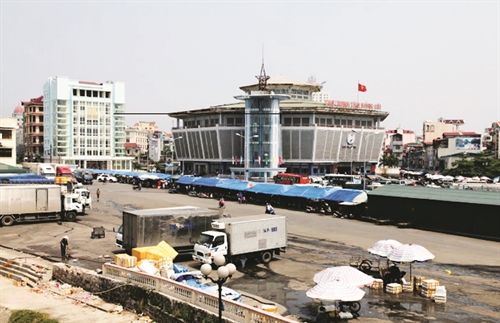Local media last month reported that nearly 400 Chinese nationals were detained after a police raid on July 27 on a gambling den in Our City urban center in the northern city of Haiphong.
This is considered the biggest-ever gambling ring run by foreigners in the country. Initial investigations showed that online transactions, worth more than CNY 3 billion (around USD 435 million), were carried out through illegal sports betting and lottery. Police confiscated nearly 2,000 smartphones, 530 computers, bank cards, cash and other relevant objects and documents at the site.
Of 395 people who were arrested, only 19 had made temporary residence registration with local authorities while the rest entered the country on tourist visas.
The case immediately aroused concern about the management of foreigners’ entry into Vietnam as well as their activities in the country.
 |
| A Russian expert and his Vietnamese collegues on an oil rig of Vietsovpetro__Photo: Internet |
Current state of management of foreigners in Vietnam
On August 22, the National Assembly’s Foreign Affairs Committee held a conference to announce results of a specialized oversight on the implementation of the law on management of foreigners in Vietnam.
According to a report released by the Committee at the conference, the management of foreigners in Vietnam is now performed on the basis of legal documents in different realms, ranging from immigration and management of foreign workers to housing, marriage, family and child adoption involving foreigners.
In the field of immigration, the legal system consists of 11 texts, including the Law on Foreigners’ Entry in, Exit from and Residence in Vietnam and 10 sub-laws. In the realms of management of foreign workers, a total of 14 legal documents, including laws and sub-laws, have been enacted.
Statistics show that the number of foreigners entering the country is incrementally increasing. In 2015, there were some 7.8 million of foreign arrivals coming to Vietnam. In three subsequent years of 2016, 2017 and 2018, the figures mounted to approximately 10.7 million, 13.7 million, and 16.2 million, respectively.
Over four years, from January 1, 2015 to December 31, 2018, 21.6 million foreigners had been screened and allowed to enter Vietnam. From February 1, 2017 to December 31, 2018, nearly 423,000 e-visas were issued, with the number of e-visas granted in 2018 equal to 186 percent of the previous year’s figure.
China was listed among the top ten countries with the highest number of visitors to the country, followed by the Republic of Korea, Japan, US, Taiwan and Russia. Around 13.5 million foreign visitors entered the country on tourist visas while the number of foreign arrivals on worker visas was more than 1.1 million.
The number of foreigners working in Vietnam is also on the rise. The official number of foreign workers in Vietnam in 2018 was nearly 89,000, a significant jump from the 2017 figure of around 72,000, with the rate of expatriates holding managerial and executive posts on the rise while the rate of technical workers is declining.
However, several limitations have revealed in the management of foreigners in Vietnam.
As stated in the Foreign Affairs Committee’s report, there remains lack of coordination in the implementation of the law on foreigners’ entry in, exit from, and residence in Vietnam. For the time being, the task of managing foreigners in the country is assigned to numerous ministries and sectors but concerned authorities still fail to build a shared database on management of foreigners, leading to difficulties in sharing and exchange of information among them. It is not to mention the fact that local administrations seem to belittle the significance of the management of foreign visitors. Some still fail to issue regulations on coordination in the management of foreigners in localities, causing difficulties to operation of responsible authorities. Others, for the sake of foreign investment attraction, have loosened the control of foreign workers, resulting in the occurrence of social order and safety disturbances involving foreigners.
Problems are also seen in the management of foreigners working in Vietnam. Under current law, foreigners who stay and work in the country for under three months are not required to apply for work permits. Many businesses and contractors have taken advantage of this regulation. In order to dodge the law, they invite or grant guarantee for foreigners to work in Vietnam for a period of under three months. But when the three-month period is going to expire, employers would bring workers to the nearest border gate to carry out the re-entry procedures so that the latter could continue working in Vietnam without having to apply for a work permit. At the same time, not a few contractors, especially foreign ones, cited schedule and quality requirements as the reason for defiance of the regulations on recruitment of local employees. There are also cases where foreign investors pledged only a tiny amount of investment. Since the investment law and enterprise law do not prescribe the minimum investment level, these investors could still enjoy work permit waivers and long-term temporary residence cards for their foreign employees.
Recommendations for addressing the situation
The Foreign Affairs Committee, in its report, recommended several solutions to address the situation.
In the legal aspect, the Committee suggested revising the Law on Foreigners’ Entry in, Exit from and Residence in Vietnam, focusing on such issues as grant of e-visas to foreigners, conditions for change of visa status, grant of visas to those having investment projects in the country, application of information technology in the management and sharing of information on foreigners, and coordination among related agencies in the management of foreigners, among others.
The Committee also proposed the Government to further direct the coordination among ministries, sectors and localities in managing and controlling foreigners’ entry and residence in the country. Besides, investment should be made to develop a system of national databases on management of foreigners.
Regarding foreign workers, the Committee said the 2012 Labor Code should be amended along the line of enhancing the management of foreign workers while simplifying administrative procedures to facilitate the recruitment of foreigners to perform jobs falling beyond the competency of Vietnamese laborers. The possibility of promulgation of a separate law on foreigners working on Vietnam is also worth considering.
Not only legislators but also experts voiced their opinions on how the improve the management of foreigners in the country.
Speaking about the significance of coordination in the management of foreigners, Nguyen Van Thanh, Standing Vice Chairman of Nha Trang Tourism Association, affirmed that it is local administrations and public security forces that shoulder the prime responsibility for management of foreigners. “The coordination among state agencies should be enhanced while the responsibility of each agency should be clearly defined,” Thanh told the Tuoi Tre (Youth) newspaper.
Meanwhile, information technology specialists underlined the necessity for application of information technology in the management of foreigners.
“We need a system for managing identity information of foreigners which must be regularly updated and able to send automatic warning messages to local administrations upon occurrence of any abnormal signs,” Ngo Tan Vu Khanh from Kaspersky Lab Vietnam said.
“What happened in Our City urban center shows a hole in information management,” Khanh told the Tuoi Tre. “There might be a lack of smooth connection between immigration offices and local residence management agencies,” he added.-
